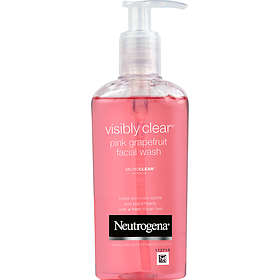
Neutrogena grapefruit face wash target skin#
Noncomedogenic formula: Noncomedogenic means the product won’t clog pores, which is key for all acne-prone skin regardless of type. Cleansing oils are another option that remove excess oil on the skin but don’t strip it in the process. Foaming cleansers can be very drying, as can some gel cleansers, whereas creamy formulas are more hydrating. If you’ve got especially sensitive skin, though, a cleanser without any active ingredients - which can dry out your skin - may be your best bet.Ĭleanser texture: Personal preference plays a big part in which texture to choose for your cleanser, but your skin type matters too. You don’t need both because each treats and prevents future problems it just depends on what your skin is like. Benzoyl peroxide, however, can go up to about 10 percent in over-the-counter treatments.

Your dermatologist can provide stronger treatments, such as in-office chemical peels, but the FDA allows only up to 2 percent of this acid to be sold over the counter.

Hartman, the founder of Skin Wellness Dermatology. Those struggling with cystic acne should consider cleansers formulated with at least 2 percent salicylic acid, according to Dr. The severity of your acne will determine which percentage of each active you should use. Benzoyl peroxide, an antiseptic, decreases the amount of bacteria on the skin. Salicylic acid reduces swelling and redness around the inflamed areas, unclogs the pores, and prompts pimples to shrink. The two most common active ingredients are salicylic acid and benzoyl peroxide. We’ve noted below which cleansers work best for which type of skin.Īctive ingredients: Although it’s not required to have an active acne-fighting ingredient in your face wash for it to count as an acne-specific cleanser - we actually list a few without one - it sure does help. Normal skin feels comfortable - neither oily nor dry. If your T-zone (forehead, nose, and tops of the cheeks) is oily and the rest of your skin is normal or dry, you most likely have combination skin.

If it’s tight and flaky, it’s probably dry. If your skin is slick, you likely have oily skin. After washing with a gentle cleanser, wait 30 minutes. If you’re not sure which skin type you are, there’s an easy way to figure it out. Those with sensitive skin should opt for a low dose of acne-fighting actives, whereas those with extra-oily skin may want something relatively strong, and people with dry skin need to look for hydrating actives like hyaluronic acid.

Aside from being acne-prone, your skin can also be extra oily, dry, or sensitive, which impacts which cleanser you should use. Skin type: Before you choose a cleanser, figure out your skin type.
Neutrogena grapefruit face wash target archive#
I spoke to 16 dermatologists and facialists to learn about their preferred acne-specific face washes, which range from creamy to foamy to gel based, and I combed the Strategist’s archive to find more vetted recommendations that will leave your skin feeling clean and fresh, not stripped or overly irritated. Cleansers also kill pollutants and bacteria we absorb in everyday life and, of course, remove our makeup - all of which can clog pores and lead to breakouts too. While your skin should be slightly acidic in order to keep bacteria out and moisture in, acne-prone skin tends to be too acidic, which causes inflammation, so it’s important to balance it. Cleansers may have shorter contact with your face than your serum or moisturizer, but they’re especially crucial for the acne-prone because they help balance the pH of the skin,” says Tess Adams, a facialist and co-founder of New York’s Take Care spa. Unfortunately, there’s no one-size-fits-all option to address acne - but a good place to start is with the right acne face wash.


 0 kommentar(er)
0 kommentar(er)
